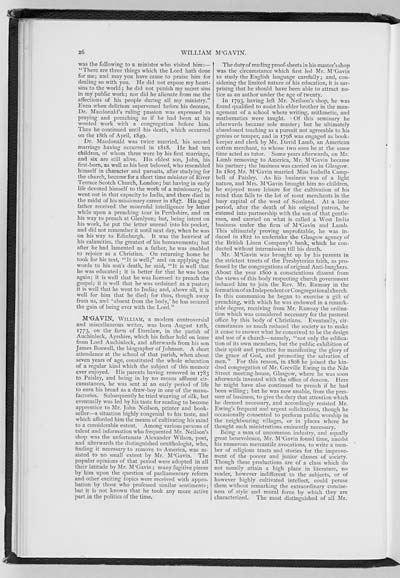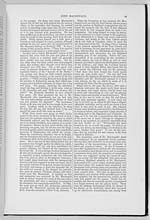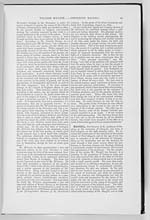26
was the following to a minister who visited him:�
"There are three things which the Lord hath done
for me; and may you have cause to praise him for
dealing so with you. He did not expose my heart-
sins to the world; he did not punish my secret sins
in my public work; nor did he alienate from me the
affections of his people during all my ministry."
Even when delirium supervened before his decease,
Dr. Macdonald's ruling passion was expressed in
praying and preaching as if he had been at his
wonted work with a congregation before him.
Thus he continued until his death, which occurred
on the 18th of April, 1849.
Dr. Macdonald was twice married, his second
marriage having occurred in 1818. He had ten
children, of whom three were by his first marriage,
and six are still alive. His eldest son, John, his
first-born, as well as his best beloved, who resembled
himself in character and pursuits, after studying for
the church, became for a short time minister of River
Terrace Scotch Church, London; but having in early
life devoted himself to the work of a missionary, he
went out in that capacity to India, and there died in
the midst of his missionary career in 1847. His aged
father received the mournful intelligence by letter
while upon a preaching tour in Perthshire, and on
his way to preach at Glenlyon; but, being intent on
his work, he put the letter unread into his pocket,
and did not remember it until next day, when he was
on his way to Edinburgh. It was the heaviest of
his calamities, the greatest of his bereavements; but
after he had lamented as a father, he was enabled
to rejoice as a Christian. On returning home he
took for his text, "It is well;" and on applying the
words to his son's death, he said, "It is well that
he was educated; it is better far that he was born
again; it is well that he was licensed to preach the
gospel; it is well that he was ordained as a pastor;
it is well that he went to India; and, above all, it is
well for him that he died; for thus, though away
from us, and 'absent from the body,' he has secured
the gain of being ever with the Lord."
M'GAVIN", WILLIAM, a modern controversial
and miscellaneous writer, was born August 12th,
1773, on the farm of Darnlaw, in the parish of
Auchinleck, Ayrshire, which his father held on lease
from Lord Auchinleck, and afterwards from his son
James Boswell, the biographer of Johnson. A short
attendance at the school of that parish, when about
seven years of age, constituted the whole education
of a regular kind which the subject of this memoir
ever enjoyed. His parents having removed in 1783
to Paisley, and being in by no means affluent cir-
cumstances, he was sent at an early period of life
to earn his bread as a draw-boy in one of the manu-
factories. Subsequently he tried weaving of silk, but
eventually was led by his taste for reading to become
apprentice to Mr. John Neilson, printer and book-
seller�a situation highly congenial to his taste, and
which afforded him the means of cultivating his mind
to a considerable extent. Among various persons of
talent and information who frequented Mr. Neilson's
shop was the unfortunate Alexander Wilson, poet,
and afterwards the distinguished ornithologist, who,
finding it necessary to remove to America, was as-
sisted to no small extent by Mr. M'Gavin. The
popular opinions of that period were adopted in all
their latitude by Mr. M'Gavin; many fugitive pieces
by him upon the question of parliamentary reform
and other exciting topics were received with appro-
bation by those who professed similar sentiments;
but it is not known that he took any more active
part in the politics of the time.
The duty of reading proof-sheets in his master's shop
was the circumstance which first led Mr. M'Gavin
to study the English language carefully; and, con-
sidering the limited nature of his education, it is sur-
prising that he should have been able to attract no-
tice as an author under the age of twenty.
In 1793, having left Mr. Neilson's shop, he was
found qualified to assist his elder brother in the man-
agement of a school where writing, arithmetic, and
mathematics were taught. Of this seminary he
afterwards became sole master; but he ultimately
abandoned teaching as a pursuit not agreeable to his
genius or temper, and in 1798 was engaged as book-
keeper and clerk by Mr. David Lamb, an American
cotton merchant, to whose two sons he at the same
time acted as tutor. Some years afterwards, on Mr.
Lamb removing to America, Mr. M'Gavin became
his partner; the business was carried on in Glasgow.
In 1805 Mr. M'Gavin married Miss Isabella Camp-
bell of Paisley. As his business was of a light
nature, and Mrs. M'Gavin brought him no children,
he enjoyed more leisure for the cultivation of his
mind than falls to the lot of most merchants in the
busy capital of the west of Scotland. At a later
period, after the death of his original patron, he
entered into partnership with the son of that gentle-
man, and carried on what is called a West India
business under the firm of M'Gavin and Lamb.
This ultimately proving unprofitable, he was in-
duced in 1822 to undertake the Glasgow agency of
the British Linen Company's bank, which he con-
ducted without intermission till his death.
Mr. M'Gavin was brought up by his parents in
the strictest tenets of the Presbyterian faith, as pro-
fessed by the congregations of original Anti-burghers.
About the year 1800 a conscientious dissent from
the views of this body respecting church government
induced him to join the Rev. Mr. Ramsay in the
formation of an Independent or Congregational church.
In this communion he began to exercise a gift of
preaching, with which he was endowed in a remark-
able degree, receiving from Mr. Ramsay the ordina-
tion which was considered necessary for the pastoral
office by this body of Christians. Eventually, cir-
cumstances so much reduced the society as to make
it cease to answer what he conceived to be the design
and use of a church�namely, "not only the edifica-
tion of its own members, but the public exhibition of
their spirit and practice for manifesting the glory of
the grace of God, and promoting the salvation of
men." For this reason, in 1808 he joined the kin-
dred congregation of Mr. Greville Ewing in the Nile
Street meeting-house, Glasgow, where he was soon
afterwards invested with the office of deacon. Here
he might have also continued to preach if he had
been willing; but he was now unable, from the pres-
sure of business, to give the duty that attention which
he deemed necessary, and accordingly resisted Mr.
Ewing's frequent and urgent solicitations, though he
occasionally consented to perform public worship in
the neighbouring villages, or in places where he
thought such ministrations eminently necessary.
Being a man of uncommon industry, and equally
great benevolence, Mr. M 'Gavin found time, amidst
his numerous mercantile avocations, to write a num-
ber of religious tracts and stories for the improve-
ment of the poorer and junior classes of society.
Though these productions are of a class which do
not usually attain a high place in literature, no
reader, however indifferent to the subjects, or of
however highly cultivated intellect, could peruse
them without remarking the extraordinary concise-
ness of style and moral force by which they are
characterized. The most distinguished of all Mr.

![]() Universal Viewer |
Universal Viewer | ![]() Mirador |
Large image | Transcription
Mirador |
Large image | Transcription
![]()

